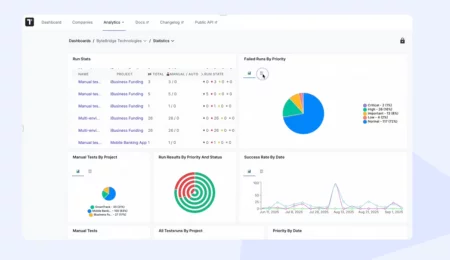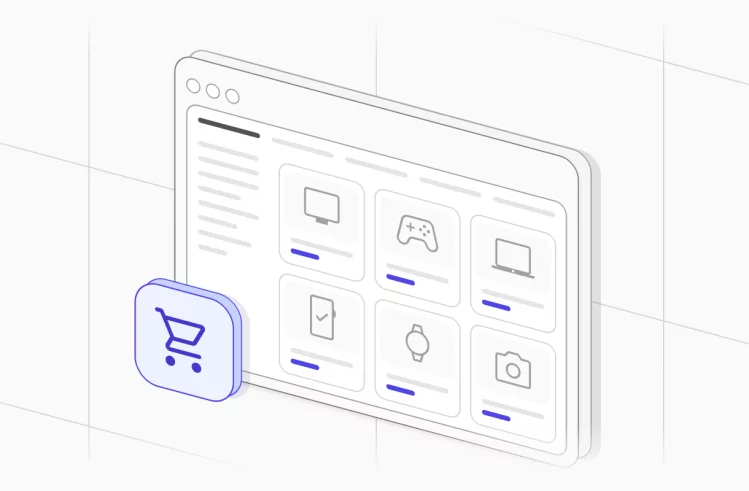Many testing teams may find it challenging to cope with the increasing complexity and fast changes in software systems when performing traditional testing. With manual creation and selection of test cases, their testing efforts are frequently inefficient and fail to adapt to codebase changes and rising requirements. As a result, they should think of implementing a modern approach for testing. Using AI for unit testing and software development is essential to avoid falling behind and enhance the efficiency and effectiveness of unit testing processes.
What is AI Unit testing?
AI unit testing means using artificial intelligence to automate test case generation of unit tests and data preparation processes. It eliminates manual efforts and verifies the behavior of each unit in isolation. If a unit does not do what it should do, the software program will not work efficiently or will not work at all.
How can artificial intelligence be applied in unit testing?
Here are six ways artificial intelligence can help you carry out unit testing:
#1: Test Case Automation
With AI tools, QA teams can save time and resources by letting machine learning algorithms analyze the lines of code and quickly generate automated test cases. By analyzing both your code and the code segment context, AI can automatically select high-risk areas for testing, generate unit tests for code segments or recommend tests that will provide insights into your code’s behavior. It will reduce manual workload and speed up the testing process.
#2: Test Case Generation
By using AI, teams can automatically generate a variety of test cases that cover a wide range of scenarios and conditions. Algorithms of generative AI for unit testing properly analyze the code to identify critical points and generate effective test cases, which will cover every possible execution scenario and enable team members to identify potential issues at early stages or before implementation.
#3: Test Case Selection
With AI-based tools, teams can quickly identify the tests which are most likely to uncover defects or choose a subset of test cases from the entire test suite to be executed in a particular testing cycle. Without running the entire suite, the aim is to select those test cases which are most likely to uncover defects.
#4: Test Case Prioritization
By using AI-backed tools, teams can see how tests are prioritized based on the code complexity, history of bugs, and code changes. By arranging test cases in a sequence that maximizes certain criteria, they help in detecting critical defects early, improving the efficiency and effectiveness of the testing process.
#5: Test Suite Optimization
AI can identify redundant or less effective tests, helping to reduce the overall test execution time. It detects error-prone areas of code and focuses testing efforts on critical flows. Furthermore, it is effective when giving recommendations on the tests that should be performed for greater test coverage.
#6: Automated Test Maintenance
Thanks to AI, test failure logs can be analyzed to identify the root cause of failures. It can also suggest potential fixes to the code or automatically update and repair existing tests to maintain their relevance and effectiveness.
Benefits of using AI to create unit tests
AI-assisted unit test creation comes with several benefits for the QA and development teams:
- Artificial intelligence tools are effective when generating a large number of tests.
- Artificial intelligence tools provide high code coverage across the project by applying the same level of thoroughness to every piece of code.
- Artificial intelligence systems can learn from feedback and improve their unit test generation efficiency over time.
- Artificial intelligence tools identify and test edge cases that eliminate human errors of overlooking.
- Artificial intelligence tools cut down the time developers spend on writing, maintaining, and running tests.
- Artificial intelligence tools update existing test suites in response to changes in the codebase.
Challenges of unit testing with AI
While AI Unit Testing offers numerous benefits, teams may face some challenges. Let’s reveal what they are:
- When it comes to unit testing with AI, teams lack standardized testing frameworks and can not establish consistent testing procedures across projects and teams.
- Teams may face difficulties when dealing with large datasets, and they require more efficient methods to manage and process vast amounts of data during the test execution process.
- When analyzing code syntax and logic, AI lacks the deep contextual understanding and might miss the broader context and business logic that dictate correct functionality, which result in tests that do not fully cover the necessary edge cases or misinterpret the intended functionality of the code.
- It may get harder for developers to rely on test automation to catch real issues. It happens because AI can sometimes generate tests that either falsely pass or fail.
To avoid mistakes, you need to write your tests before you write the actual code so that each part of your application is tested as it’s developed. Also, you need to make sure that you use realistic synthetic data that mimics real-world scenarios before generating tests.
More importantly, you need to integrate unit testing into your CI\CD pipelines to ensure tests are automatically run with every code change, catching bugs early. It helps maintain code quality throughout development.
Popular AI Tools for Unit Testing
Here are the top tools on the market today for writing unit tests. These tools use various AI techniques to automate and optimize different aspects of code review, test generation, and quality assurance.
- CaseIt It is a specialized testing tool that automatically generates test cases for diverse testing scenarios.
- Bito Used for Behavior-Driven Development (BDD), this tool offers artificial intelligence code reviews for Git workflows, AI code generation, and plan-to-production developer agents for IDE or CLI.
- Unit-test.dev This AI tool helps teams create unit test cases, supports multiple languages (Python, JavaScript/TypeScript, Java, C#) and IDEs to produce more accurate results when used in specific parts of the code.
- Virtuoso QA Using natural language processing, it simplifies test creation and execution, provides low-code/no-code testing, self-healing test scripts, etc.
- Checksum.ai This tool applies AI for test creation and maintenance.
- Carbonate Integrated into your existing testing framework, it helps teams write tests in plain English, offers a code coverage analysis, and detects areas lacking proper unit testing.
- Google Cloud’s Duet It offers AI-based code completion and generation for developers.
- Diffblue Cover With this AI-powered tool, teams can automatically generate JUnit tests for Java applications.
- Keploy An AI tool used as a test case generator for end-to-end test cases based on real user interactions.
- Github Copilot It is used to generate unit and integration tests as well as help improve code quality.
One of the coolest tools on this list is Copilot. So let’s take a look at AI unit testing in action with an example of how Copilot works. We will show you how to start using AI Copilot by demonstrating the ins and outs of generating test automation. After that, we’ll discuss Copilot’s strengths and weaknesses. Although many tools listed here use similar NLM concepts, we will not compare them in this context.
Why Copilot?
GitHub Copilot is a reasonable choice for QA engineers and developers; it boosts their productivity, improves code quality, and helps release faster.
GitHub Copilot for AI unit testing helps reduce the tediousness of writing unit tests. Integration into an IDE is advantageous as the testing tool exposes the code to the AI Copilot Chat, making it easy to tell the IDE to generate tests for a function, method, class, etc. Even a junior coder can easily write unit tests to ensure quality development. It has wide support in VS Code, Visual Studio, IntelliJ IDEA, Vim, and other IDEs. Works with multiple programming languages.
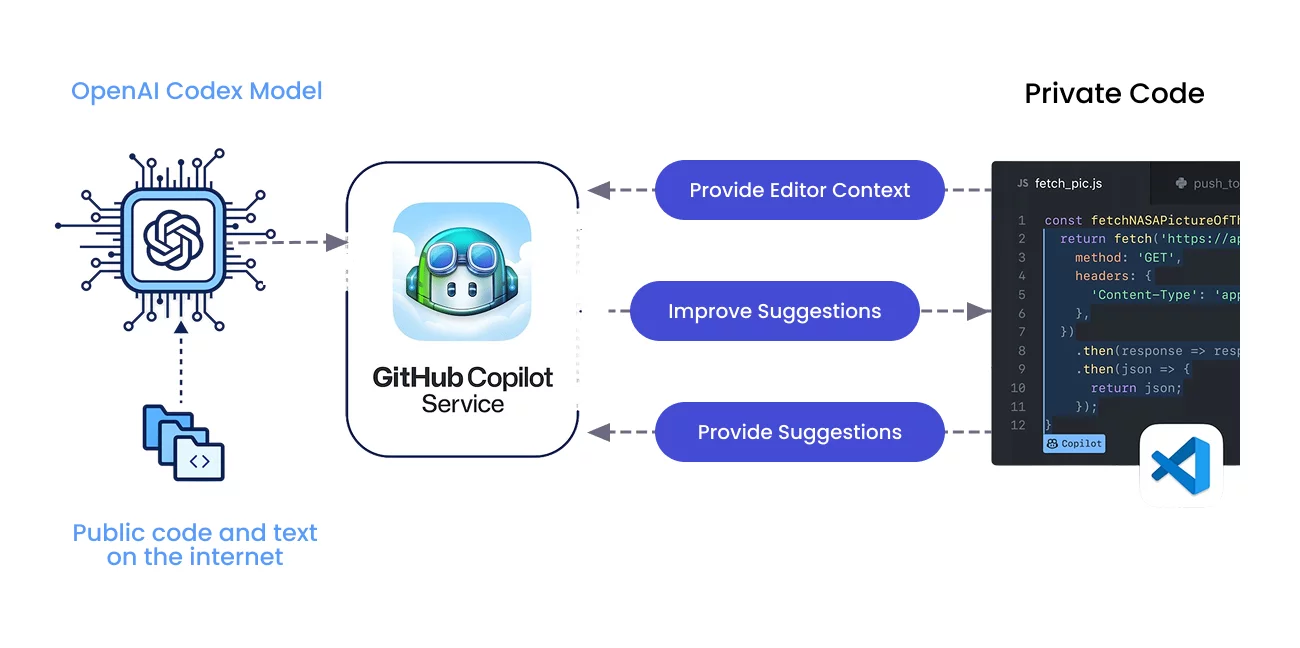
Microsoft provides the Copilot feature or service to users at no cost, and charges a premium for its advanced features.
Utilizing Copilot for Writing Unit Tests in VS Code
Copilot offers several ways to generate tests. We are focusing on using the Copilot integration with Visual Studio Code, which is a fairly representative one. To use Copilot in VS Code, we must first install it. Important prerequisites — you must have a GitHub account if you are using Copilot.

After installation, GitHub Copilot displays the chat screen as shown below.
AI-generated Unit Tests with VSCode
In VSCode, there are two primary ways to generate tests. You can enter commands in Copilot chat or you can use the right-click menu in a code file and select to generate tests. It offers AI-based code suggestions and auto-completions. To generate tests in the Copilot chat, enter a prompt asking Copilot to generate tests for the method or function. As a suggestion, on our request, Copilot provides unit test cases.
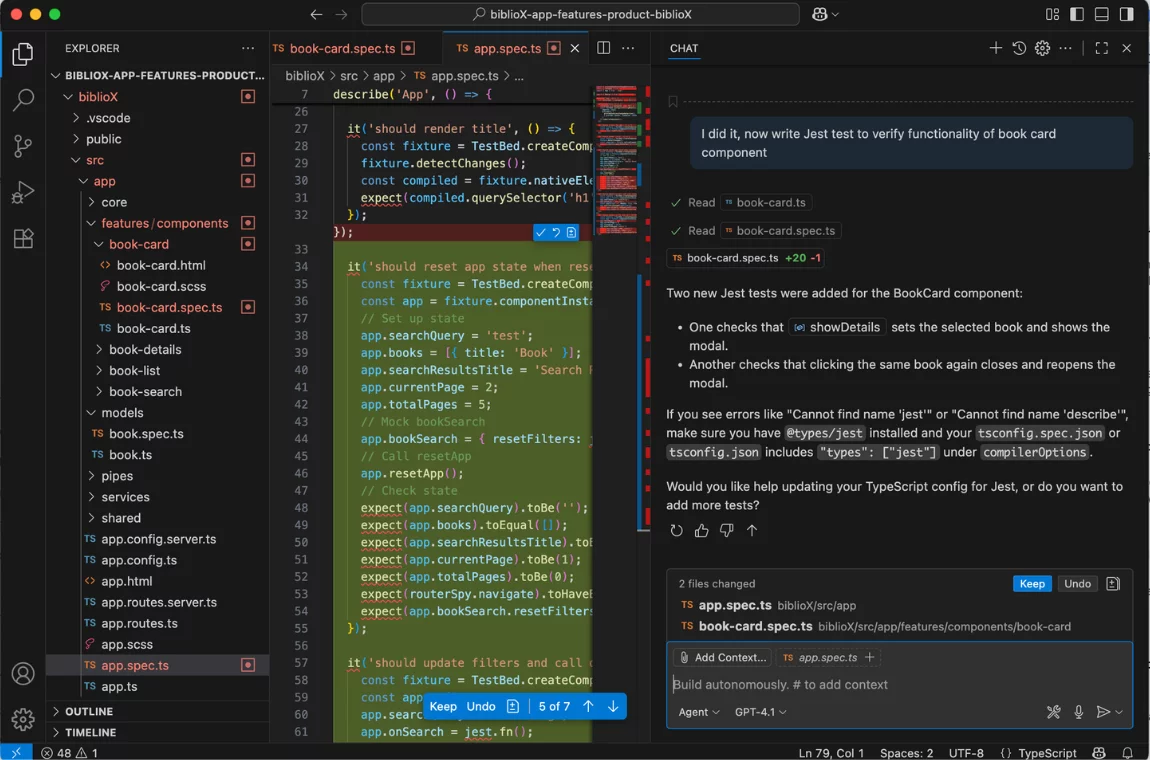
Occasionally, Copilot responses might introduce errors because it lacks full context and a natural sense of user sense — be sure to double-check the results of its suggestions. And look at an example of Jest Unit tests Copilot provides:
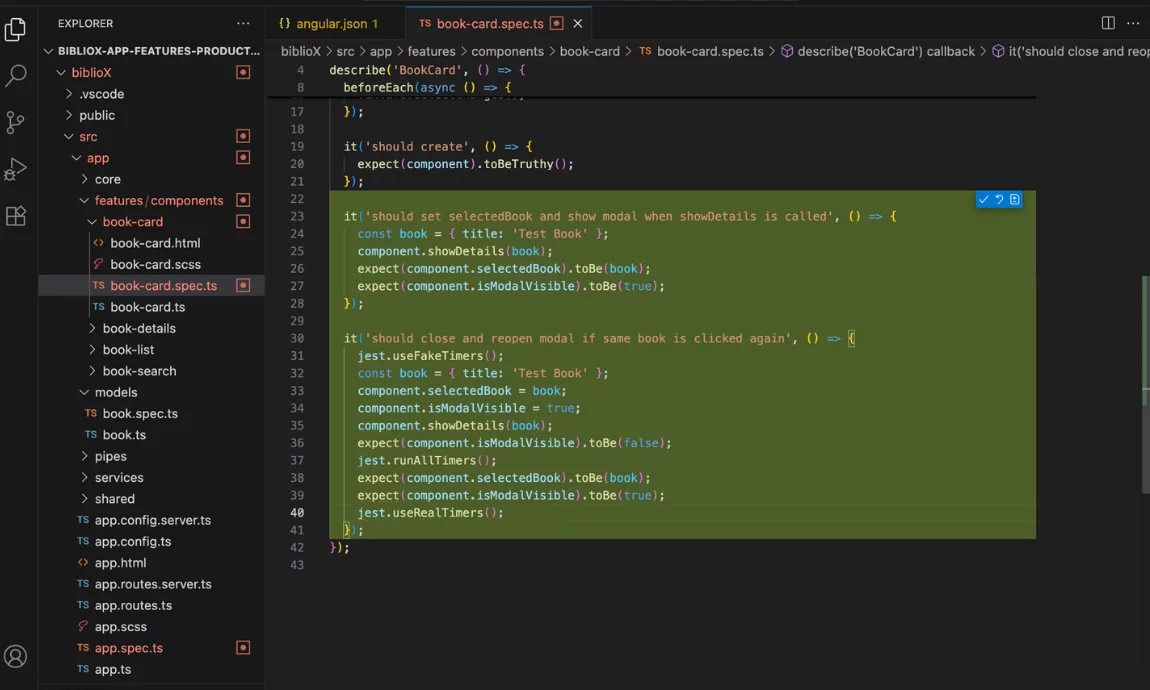
This Jest Unit test Copilot example code does not include setTimeout()which is better than jest.runAllTimers() in our use case. It might cause runtime issues. However, numerous users have found that Copilot attempts to predict your application’s logic but lacks a true understanding of its underlying structure or embedded details. It operates within the confines of a specific code snippet and ultimately functions in a highly intuitive manner.
Test coverage is always lacking in one way or another, if it exists at all. Leveraging AI unit testing in development is a good way to add value and decrease the significant risk of non-qualitative code.
You might also find this topic valuable:
Asking an AI to generate test automation for your code has the added advantage of providing an extra pair of eyes 👀 on your code. To an extent, the quality of the generated test code is correlated to the quality of the code being tested. When AI Copilot struggles to generate tests or produces tests, it can be an indication that the code is not easily testable, the application code is complex or incomplete. Conversely, it offers a valuable hint about refactoring: if Copilot struggles to suggest text, it may indicate that your code is overly complex and could benefit from simplification.
GitHub Copilot Agent VS Copilot Chat
You should pay attention to GitHub Copilot Agent. GitHub Copilot Agent is not only a code suggester, it is an advanced AI-powered extension that provides multi-step assistance to teams across the entire software development lifecycle — not just code completion. Learn more with the Execute Automation YouTube video, How GitHub Copilot Agent Writes Perfect Code & Tests 🤯
Best Practices For Implementing Unit Testing AI in general
We hope that following these best practices will help you implement AI unit testing successfully:
- At the very start, you need to define the goals you aim to achieve with your AI unit testing and make testing data clean and well-prepared. Removing inconsistencies and errors from your data enhances reliability. This also improves the validity of your unit tests.
- You need to create isolated tests for individual units in isolation. to identify specific issues within each unit and make debugging easier and more effective.
- With artificial intelligence tools for writing unit tests, you can generate tests and data automatically, adapt to changes in the codebase, and continually improve the tests. However, don’t forget to keep your test cases and data up to date, regularly track test coverage, and analyze performance metrics to optimize your testing strategy.
- By updating tests regularly, you make sure that test cases remain relevant and effective in catching new bugs.
Bottom Line: Ready to use AI-based Tools For Unit Testing?
With AI-driven tools for unit testing, you can make sure that your software testing is both efficient and highly effective. You can also ensure that web applications and mobile applications are functional and reliable. By implementing effective testing strategies and utilizing the right AI tools, you can improve code quality, reduce bugs, and avoid delays and bottlenecks in the development cycle.
If you’re hesitant to apply AI directly to a production codebase, that hesitation is well-grounded. Anyway, AI is amazing, as it significantly speeds up work, allowing us to deliver quality products and add more value to our clients in a more timely manner. However, we should always be cautious, keep our eyes open, and ensure we understand what we’re doing and what the AI tools are doing for us.
👉 Drop us a line today to learn how we can help you enhance your testing processes and deliver high-quality software that meets the highest standards.
Frequently asked questions
How is AI different from traditional automated unit testing?

AI-powered unit testing goes beyond running pre-written test scripts. It can automatically generate test cases, predict potential failure points, and adapt test coverage based on code changes. Traditional automation follows fixed rules, while AI learns from past results to improve test relevance and efficiency over time.
Can AI-generated tests replace manual test creation entirely?

Not yet. AI can greatly reduce the manual effort by generating and maintaining a large portion of tests, but human oversight is still essential—especially for complex business logic, edge cases, and compliance-heavy applications. The best results come from a hybrid approach where AI handles repetitive, coverage-focused tasks and humans handle nuanced scenarios.
Is AI-powered unit testing suitable for all programming languages and frameworks?

Most modern AI testing tools support multiple languages and popular frameworks, but compatibility varies. Some are optimized for JavaScript/TypeScript, Python, or Java, while others integrate directly with test frameworks like Jest, JUnit, or PyTest. Checking language and toolchain compatibility before adoption ensures smooth integration into your development workflow.
